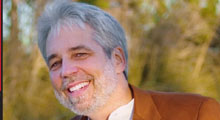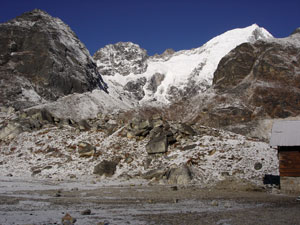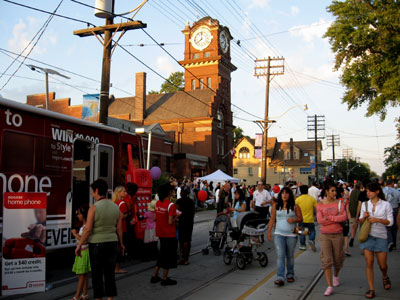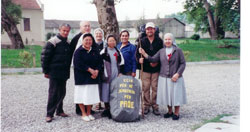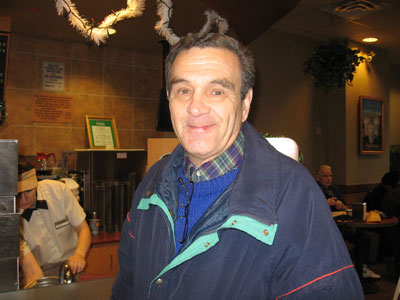Scott contacted me about a week ago after having come across this website. We realized that we shared a lot of common philosophies and emails started flying back and forth furiously, capped off by a very long telephone conversation.
Scott is an interesting individual, he has studied linguistics and finished his academic studies with a doctorate in theology. He has worked as a social activist, ranch hand, in social activism, in higher education, as an author, in technology education and in travel. He has travelled to many countries, despite the fact that he has to use a wheelchair. Along the way he has become an expert on disabled travel and “universal design”, a design philosophy that makes buildings and facilities available to all people: young, old, tall, short, strong, weak – not just the temporarily able-bodied.
 Scott Rains in Bratislava
Scott Rains in Bratislava
1. Please tell us a bit about yourself and your background.
I grew up in Pacific Northwest. I believe I went camping once a month for all the years I was in Boy Scouts and on longer summer treks, canoe trips, or camps until I started working summers as a ranch hand on the North Platte River in Wyoming.
2. A major life event occurred when you were 17 years old. Please tell us
about that.
One Sunday before my 18th birthday I achieved what was then my life’s dream. I was certified as a ski instructor. That Thursday afternoon I awoke from a biopsy on a spinal tumor paralyzed.
Three months later, my best friends convinced me that I should get out of the hospital and go to a concert with them. Later still that the same group of us camped outdoors for a week to attend the Ashland Oregon Shakespeare festival. One day, driving back to camp, a guy sped up along side our pickup on the country two-lane to ask if that was our wheelchair in the road about a mile back.
It was, of course, and that was about the time that I started thinking, “I’m going to need to figure out a new way to pack for traveling. I guess every trip is going to be adventure travel now.
3. You are a self-described adventurer and have traveled to many places
since you became disabled. Please tell us about the destinations you have
visited and some of your experiences.
In college I studied in Brazil for a semester but I actually made a conscious decision not to travel as much as I could have when I returned in order to pursue the path of a social activist during the 1970’s and 1980’s. I kept on the move a bit with cross-country drives, a rail trip across Canada and academic travel to England and Wales. Mexico was on the itinerary as my wife and I took a group of students down for a service project. We actually won a free week in Kauai in the days before outfitters would let people with disabilities on Zodiac tours of the Na Pali Coast.
Recently much of travel combines research on destination accessibility like trips to Austria, Slovakia, New Zealand, and a day in Argentina. I have been fortunate enough to explore Australia, Taiwan, Japan, and Brazil on visits to speak on Inclusive Tourism in those countries. I am looking forward to taking up invitations to Nepal, Thailand, and Romania.
4. Please share with us your 3 favorite travel memories of all times.
My all-time favorite is a story of compassion directed toward me as a college student while living in Brazil.
A bit of history first.
In the mineral rich Brazilian state of Minas Gerais the wealthy sponsored construction of numerous chapels and commissioned artwork during the colonial period. The most famous architect and artisan of the time was a disabled man known popularly as “Alejadinho.” One day, on my way to visit his most famous site in Congonhas, I asked three women begging in front of the church how best to enter in my wheelchair. Rather than answer me they placed all placed their entire day’s earnings and hurried away in spite of my protests. I don’t believethat I will ever be wealthier than I was at that moment.
I also recall being scared to death as the Volcan de Agua erupted a large plume of steam a few feet in front of us in the caldera. My Guatemalan friend had only just finished weaving a yarn about how the god of the volcano didn’t like “gringos.”
Right there at the top of my list is a much quieter memory. In the retelling it seems unremarkable, I suppose. Part of my doctoral work was done in Oxford, England. Meeting my fellow students was inspiring. One in particular had a life changing impact on me. What I recall most is that every day a small group of these friends walked me the two miles home – then walked back to their own homes.
5. What are the unique travel challenges of someone with a disability? How
accessible are travel destinations to disabled travelers today?
Quality information about accessible sites and services is key. People with disabilities travel by word-of-mouth recommendation more than other market segments I am told. Carting batteries for hearing aids; backups of medications; replacement parts for electric wheelchairs or speech synthesizers can all be part of the logistic task.
Some countries, notably Jamaica, will not let you in with a service dog. Many hotel chains, beautifully accessible in the US, apparently do not want our money in some of the hottest tourist destinations. That’s unfortunate for them since the Harris Online survey commissioned by the Open Doors Organization in 2002 and again in 2005 documents that people with disabilities are traveling in ever greater numbers. In the US alone we number more than 46 million and spend in excess of $13 billion annually on travel. We also consistently report that we would travel more if the options were available.
6. Please tell us about the publications you are involved in and what they
are about.
I publish the Rolling Rains Report daily (http://www.RollingRains.com) where I try to highlight what the travel & hospitality industry is doing right. I am especially pleased when I can profile best-of-class products like Estate Concordia eco-lodge in the US Virgin Islands, O’Carrollyns resort in Port Stephens Australia, the Devil’s Playground backpacker hotel circuit around Tasmania, Rolling Around the Algarve accessible lodging, real estate, and events in Portugal, or Aventura Especial adventure outfitters in Brazil.
When I find something that is particularly timely I include it in the Rolling Rains Newsletter ([email protected])
I edit the Travel & Disability section of Suite101.com where you will find abut 40 articles (http://www.suite101.com/articles.cfm/travel_with_disabilities). I just completed editing a collection of scholarly articles on travel for the journal Review of Disability Studies also.
7. You have also been a resident scholar at the University of California
at Santa Cruz. What were you involved in with the University?
I was invited by the Center for Cultural Studies to pursue independent research from June 2004 to July 2005. The fellowship allowed me to write many of the Suite101 articles; complete preparation for the addresses I have given at Inclusive Travel conferences in Brazil, Japan, Australia, and Taiwan, and finish editing all the articles in the Travel Forum issue of the Review of Disability Studies.
While there I was also able to work with a group called Shared Adventures (http://www.sharedadventures.com/) on events called Day on the Beach (http://www.dayonthebeach.org/photogallery/2005/) and Day in the Sky (http://www.dayinthesky.org/). A group of us put on the region’s first conference on Universal Design as well. (http://www.universaldesignconference.com/)
8. Please explain to us the concepts of “universal design” and “inclusive
travel”. How do they relate to the topic of travel and hospitality?
The quick answer is that Universal Design consists of the seven principles that constitute all good design: equitable, flexible, simple, understandable, safe, easy, and proportional. Universal Design starts with the observation that people come in different in sizes and with different capacities and those change through each individual’s lifecycle. An infant, child, youth, adult, and senior each differ but object, spaces, information, and policies can be designed to intentionally include the broadest range of differences without diminishing the level of participation open to any. You can find a good description of Universal Design here.
Inclusive Travel is what results from the application of Universal Design in the travel and hospitality industry. (http://www.suite101.com/article.cfm/18423/114773)
Inclusive Destination Development is that form of sustainable tourism practice that applies the principles of Universal Design to the process of creating desirable tourist destination that include the broadest range of people possible without stigmatizing any. (http://www.suite101.com/article.cfm/travel_with_disabilities/115176)
9. You also have a strong interest in sustainable development,
particularly as it relates to tourism. Please comment.
Sustainable development and tourism go hand-in-hand as the UN has shown and as the Australian organization Green Globe 21 promotes.
In November 2004 the international promoter of Universal Design, Adaptive Environments, met for their biennial conference, “Designing for the 21st Century.” I was selected to organize a full-day pre-conference entitled “Universal Design and the International Travel & Hospitality Industry.” At the end of the conference I was also invited to join the South American delegates as an observer while they hammered out a document on implementing Universal Design across their continent. They brought their own unique synthesis to the field producing the “Carta do Rio” or the “Rio Charter on Universal Design as Sustainable Inclusive Development.”
Basically, the document sets out the arguments for how the inclusive human-centered approach of Universal Design is consistent as the complimentary completion of the green sustainability approach. What I find so satisfying is that this synthesis points to new economically viable practices in the industry at just the time when there is rising interest in travel by seniors (aging Boomers) and people with disabilities.
